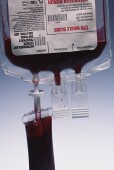
SATURDAY, June 12 (HealthDay News) — A U.S. Department of Health and Human Services panel of experts on Friday voted to uphold a decades-old ban on gay men donating blood, while advocating for more research on the controversial issue.
The current policy — put into effect in 1985 during the early days of the AIDS crisis — prevents any man who since 1977 has had sex with another man from donating blood.
In hearings Thursday and Friday, the Health and Human Services’ Advisory Committee on Blood Safety and Availability considered calls for a revision of the policy in light of scientific innovations made over the last 25 years. Those changes have led to marked improvements in blood screening and HIV detection, experts say.
Current technology, for example, allows for detection of HIV in the blood in as little as two weeks following infection.
But the high-ranking panel voted 9 to 6 to uphold the blood donation ban for gay men, citing a very small but still unacceptable risk to the blood supply, the Chicago Tribune reported. The panel deemed the current policy “suboptimal,” however, and recommended steps toward a policy that looks at individual behaviors rather than barring a broad group such as gay and bisexual men.
Among the recommendations, according to the Tribune: questionnaires filled out by prospective donors that might spot risky sexual behaviors, regardless of sexual orientation; studies into the feasibility of prescreening protocols that would determine if a particular gay male could safely be a donor; and more study into donor demographics to determine which are at highest risk of transmitting a range of blood-borne pathogens, including newly emerging varieties.
Critics of the current system are numerous.
“When the policy was first instigated in the 1980s there was good reason for it, based on the testing technologies we had at the time,” said Chris Collins, vice president and director of public policy for the Washington, D.C.-based Foundation for AIDS Research (amFAR). “But since then, testing technology has greatly advanced in its ability to test what’s in the blood. And yet our policy hasn’t.”
Many other groups agree with that view. In 2008, the American Medical Association called for ending the lifetime ban for gay men in favor of a policy that would accept blood donations from men who have sex with men — so long as five years have elapsed since their last sexual encounter.
And in a policy statement issued Thursday by the American Red Cross, the organization said it believes that “the current lifetime deferral for men who have had sex with other men is unwarranted and donor deferral criteria should be modified and made comparable with criteria for other groups at increased risk for sexual transmission of transfusion-transmitted infections.”
The Red Cross reiterated its position outlined in 2006, in a statement issued jointly with the American Association of Blood Banks and America’s Blood Centers. That statement said that men who have sex with men should be allowed to donate, as long as 12 months have elapsed since their last sexual contact.
Various advocacy groups have echoed those sentiments. New York City-based Gay Men’s Health Crisis (GMHC), along with the Human Rights Campaign, the National Gay and Lesbian Task Force, amFAR, the Hemophilia Federation of America, and the National Hemophilia Foundation issued a joint statement earlier this week pushing for a repeal of the ban.
They urged Health and Human Services to “recommend any scientific research that is necessary to allow for the thoughtful consideration of alternative policies regarding donor deferral.”
U.S. Food and Drug Administration experts have estimated that the rate of HIV infection among likely gay blood donors would be 15 times higher than that of the general public.
However, experts say the science of detecting HIV in donated blood has grown considerably over the past few decades. And the U.S. Centers for Disease Control and Prevention has found no evidence of any HIV transmission related to blood transfusions between 2002 and 2007.
Widening donations to include gay men would greatly help the blood supply. As reported by MSNBC, one recent study from the Williams Institute at the UCLA School of Law found that replacing the ban with a one-year deferral period would lead to an increase of nearly 90,000 pints of donated blood each year.
More information
There’s more on the safety of donated blood at the American Red Cross.

